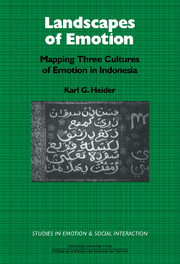Book contents
- Frontmatter
- Contents
- Acknowledgement
- PART I THEORY, METHOD, AND RESULTS
- 1 Theoretical introduction
- 2 Mapping the realm of emotion
- 3 Membership in the realm of emotion: prototypicality
- 4 Emotion scenarios: antecedents and outcomes
- 5 Comparisons between languages
- 6 The composite maps of emotion terms, cluster by cluster
- 7 Conclusions
- PART II A CLUSTER-BY-CLUSTER ANALYSIS OF THE COMPOSITE MAPS OF EMOTION TERMS
- Bibliography
- Author index
- Subject index
3 - Membership in the realm of emotion: prototypicality
Published online by Cambridge University Press: 22 October 2009
- Frontmatter
- Contents
- Acknowledgement
- PART I THEORY, METHOD, AND RESULTS
- 1 Theoretical introduction
- 2 Mapping the realm of emotion
- 3 Membership in the realm of emotion: prototypicality
- 4 Emotion scenarios: antecedents and outcomes
- 5 Comparisons between languages
- 6 The composite maps of emotion terms, cluster by cluster
- 7 Conclusions
- PART II A CLUSTER-BY-CLUSTER ANALYSIS OF THE COMPOSITE MAPS OF EMOTION TERMS
- Bibliography
- Author index
- Subject index
Summary
My master lists contained only words claimed by some chain of presumably fluent authority to be emotion words, and the final check in this chain of authority was usually agreement among my three research assistants – three very intelligent middle-aged Minangkabau women.
To be precise, we should recognize that I am not describing emotion in Indonesia, but rather the realm labeled perasaan hati in Indonesian, or, in Minangkabau, raso ati. These realms are equivalents to the English realm “emotion” but, we must assume, are not identical. These realms are overt categories for Indonesians, familiar and easily recognizable, with a label, perasaan hati (the root is rasa, an important Sanskrit term for emotions; but pressing the investigation back to India probably does not help us understand the Indonesian usages [Deutsch 1975; Bagchi 1983; Stange 1984]). Although perasaan hati corresponds to the English term “emotion,” the borrowed term emosi is used in Indonesian most commonly for only a subset of strong negative emotions. (However, in other contexts, such as modern Indonesian movies, emosi can mean “emotion” in general.)
It is clear, however, that many of the Indonesian and Minangkabau clusters spill out beyond words that have strong prototypicality as emotions. To investigate this, I asked fifty respondents in each language to judge the words on the master list:
Is the word certainly an emotion word?
Is the word certainly not an emotion word?
Is the word sometimes an emotion word?
- Type
- Chapter
- Information
- Landscapes of EmotionMapping Three Cultures of Emotion in Indonesia, pp. 41 - 51Publisher: Cambridge University PressPrint publication year: 1991



